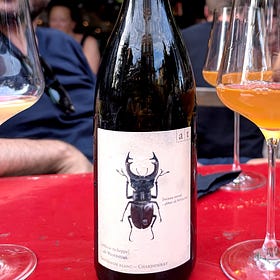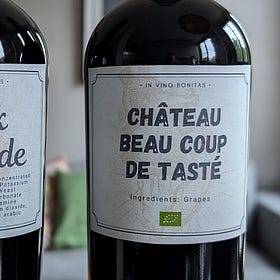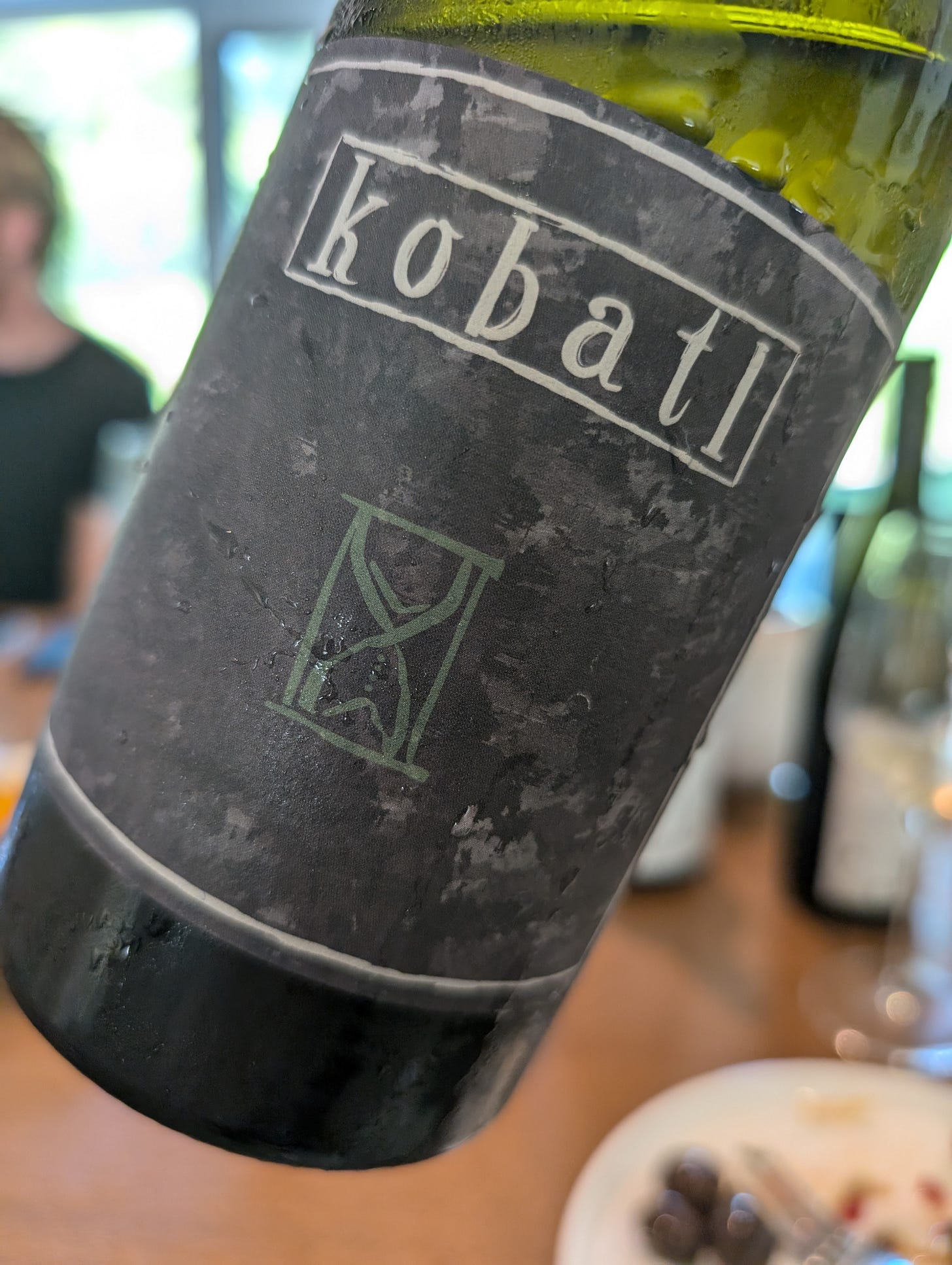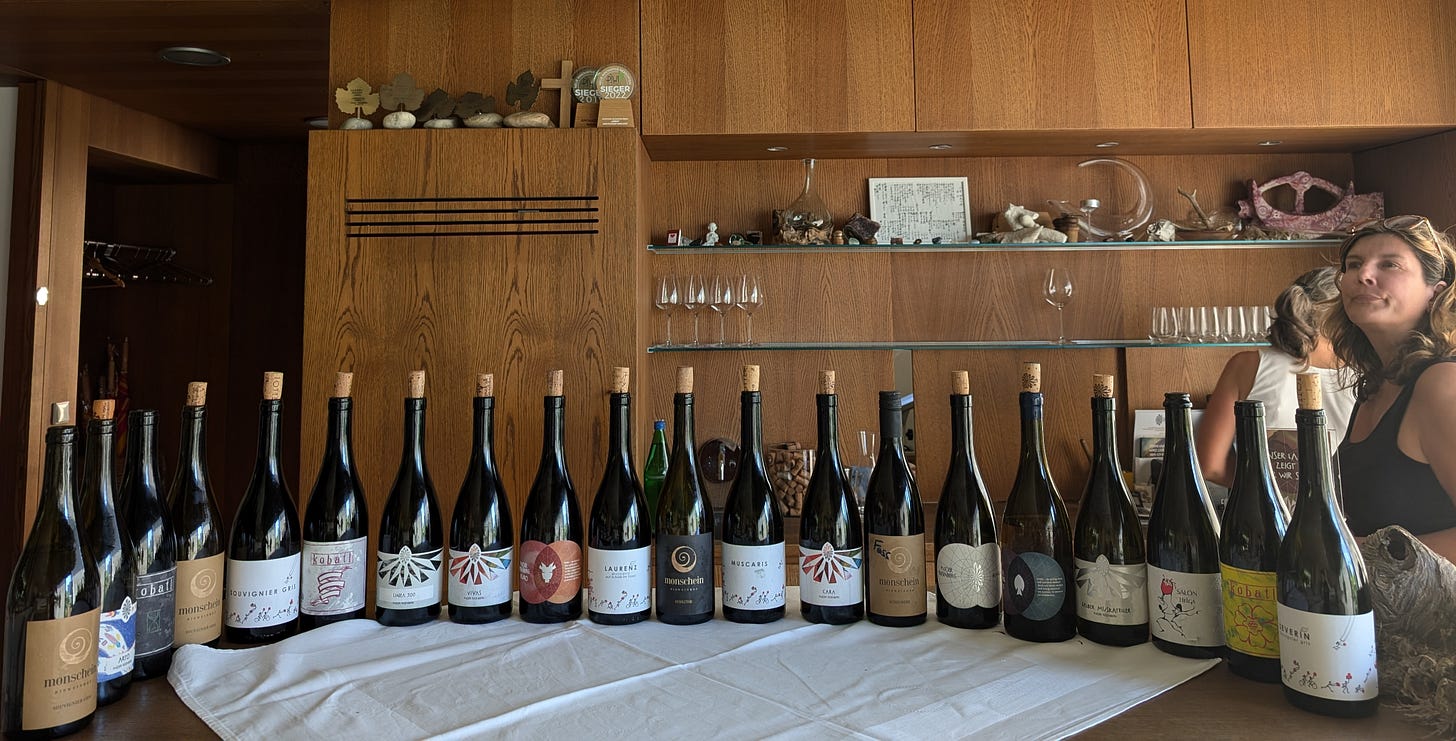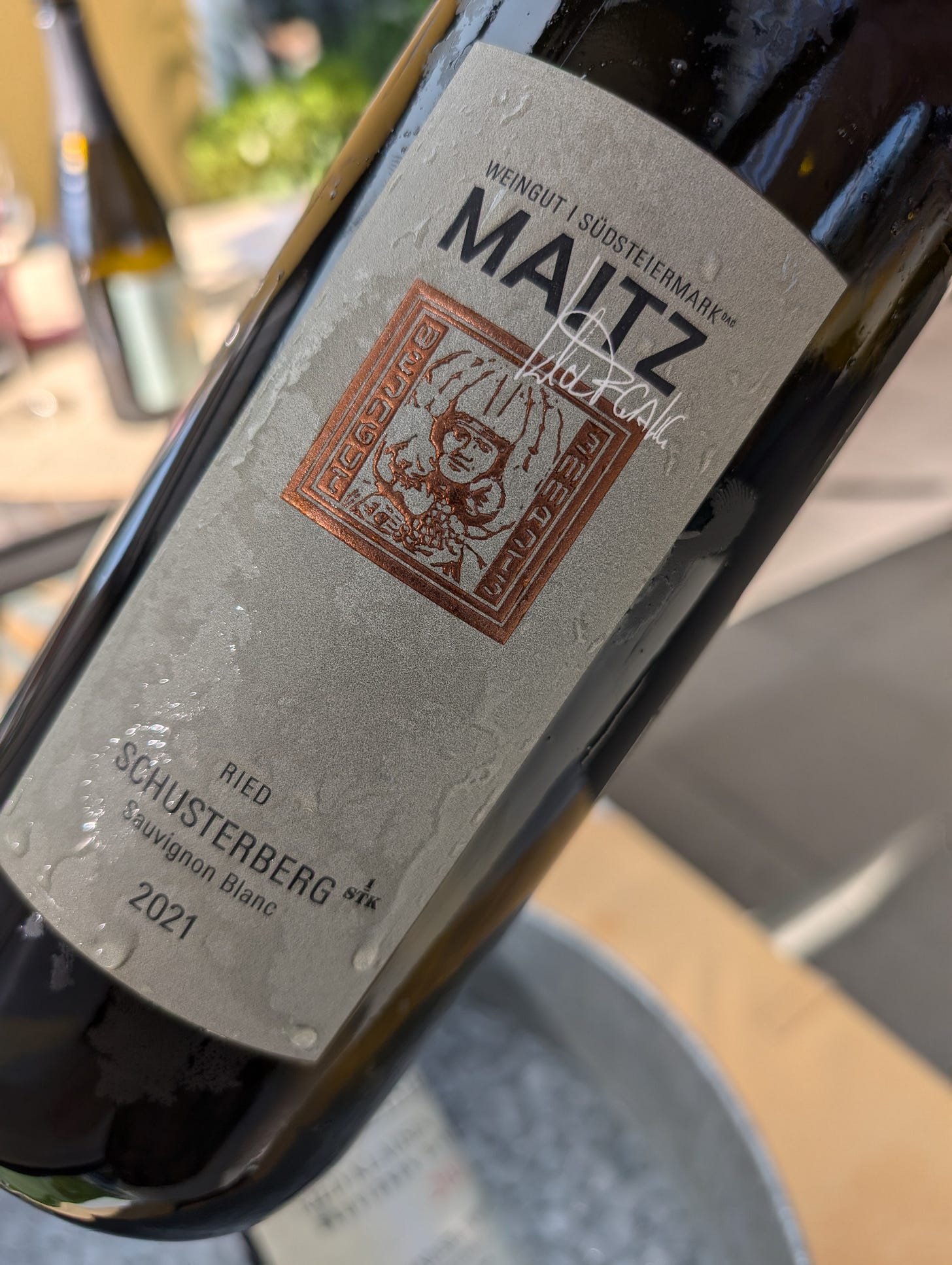Despatches from the Road I
Visiting inspirational growers in Southern and Eastern Styria
I’m on the road until the end of August, so the next few newsletters have to be squeezed in as and when possible. I will do my best to maintain the weekly rhythm. This is written for you onboard a Flixbus to Ljubljana, trying hard to avoid travel sickness while typing. About half of this post is free to read. When you get to the cliffhanger, please consider if you could support my work as an independent journalist and wine writer.
In case you missed it, half of last week’s piece on the sustainability of plastic kegs is also free to read. The rest is available to paying subscribers, along with these two paid-only posts:
We Don't Need No (Orange Wine) Education
When will the wine press update their stale narrative on macerated wines?
Less is Better
Following on from my look at the new EU labelling laws, I go one step deeper and ask, why is it better to have wines with less ingredients and less processing?
Last week I took a group of Dutch sommeliers for an immersion into Styria, one of my favourite Austrian wine regions. Here are brief notes on the highlights.
There is so much exciting wine being made in Styria, but yet more important is the passionate and deep-rooted conviction in conscious farming. So many of the growers we visited have been on a journey, gradually connecting more deeply with their land. That journey typically starts with organic conversion, and frequently becomes more profound when biodynamic techniques are adopted.
This inevitably prompts a reappraisal of cellar work. Minimal intervention is not a fashion, it’s a consequence or a response to what happens in the field. When so much energy is invested in the health of the soil and the vines, growers have the strongest impulse to let nature process their grapes with the least interference. Of course fermentation and maturation need hygienic conditions and gentle guidance. But the fewer interventions that are necessary, the better the wine can express its origin and the specific conditions of the year and site
.Tamara Kögl has been at the helm of her family’s business for 15 years. She increased the estate to 10 hectares, and opened a buschenschank1 which serves as a platform for her wines. Tamara has worked with biodynamics for years, and now has Demeter certification. Visitors to this jawdroppingly beautiful location can sit in the garden and admire the vines plunging down the hillside, as they snack on home produced charcuterie and enjoy all of Tamara’s wines by the glass.
Echoing the abstract designs on her labels, Tamara explained that “When I taste wine, I don’t taste fruit. I see colours and structures. Sometimes I see personalities.” She also added that “for me biodynamic work is a lot about balance. It’s not just about making wine.”
The high points for me included two vintage blends. Her Sauvignon Blanc “Meierei” 2020/2021 has lovely weight and roundness, with pure and ripe fruit. Unconditional Love hit the high notes for me. Made from three different vintages of Muscat Ottonel fermented on the skins (21/22/23), it has those wonderful floral aromatics and nutty tannins. The blend really seems to work well, resulting in perfect freshness and lift, and no doubt a bit more complexity than a single young vintage would have alone. Her Under Pressure 2023 pét-nat and a single vineyard Sauvignon Blanc, Semlitsch 2021, also come highly recommended.
We took a deep dive into the world of PIWI grapes, with some of Eastern Styria’s top exponents. Ploder-Rosenberg’s vineyards are now around 80% planted with these new disease resistant crossings, including Souvignier Gris, Bronner, Muscaris and Blutenmuskateller. It’s hard not to be drawn in by Manuel Ploder’s caring and spiritual approach. He cautioned us that even PIWIs are not necessarily the ultimate solution to questions about sustainability. For him, healthy soil is far more important. Even classic Vitis vinifera varieties can prosper and resist disease to some extent, if they are sufficiently nurtured.
The Ploder family’s journey has been long and profound. Alfred Ploder (Manuel’s dad) had a massive change of heart in 2004, dissatisfied with both his farming and his winemaking. “This is the place where we live” he explained. “I want that it stays beautiful. And I was not making wines that I wanted to drink.” The farming was first to change, in 2004, and in 2005 the winemaking followed suit. The Ploders have reduced their vineyards, handing back rented plots, and their production has also been reduced from 150,000 bottles a year (in the early 2000’s) to just 40,000 now. The aim is a much more focused, high quality approach, where husbandry of the land is at the centre of everything.
Freddy Ploder also has his own take on wine. “It’s not important how it tastes” he said. “It’s important how it makes you feel. Wine should be like medicine. And Medicine must not [does not have to] be beautiful, or flirting with your eyes. It should be good for your body.”
Ploder-Rosenberg’s elegant, fruit-forward blends and single varietals probably need little introduction to my readers. Barrel samples from the soon-to-be-bottled 2021s were very promising. The powerhouse that is Linea 500 (2017 Souvignier Gris) continues to impress me. Read the troubled story of this wine’s label here. Vivas 2020 is a joyful, juicy blend of aromatic varieties, with a delightfully pinkish hue.
Michael Gangl (Kobatl) manfully showed up on crutches after snapping his achilles tendon. His wines had no such impediment. Time Runs Fast 2019 is perhaps the most gorgeous Bronner I’ve ever tasted. It’s floral, with great concentration and lift. My Dirty Siva 2022 is his Souvignier Gris. There’s nothing dirty about the wine, which has a delightful sage note, a pleasing hint of reduction and wonderful vitality.
Josef Totter and Klaus Monschein are both neighbours to Ploder-Rosenberg. Both showed promising wines. Totter works only with Souvignier Gris and Muscaris. His Severin 2021, Souvignier Gris long on the skins, was pleasingly savoury and structured.
Lackner-Tinnacher has the distinction of being the only female-run/female winemaker in the STK group of 12 Styrian winemakers. Katharina Tinnacher took over from her father in 2013, seamlessly continuing and developing the estate’s refined and restrained style, whilst also converting their 27 hectares to organic farming.
These wines are pin-sharp and so elegant. Winemaking is just as low on intervention as the other estates mentioned here. No additives, no temperature control, no blocked malo and mostly unfiltered.
High points included the Ried Welles Sauvignon 2021, Ried Eckberg Morillon 22 and a deliciously leesy Welschriesling Franz Lackner 2021. A Sauvignon Blanc Steinbach 2001 (under cork) was in absolutely blinding shape, showing opulent and ripe fruit aromas and flavours.
An expansive evening hosted by STK winemakers2 at Wein Refugium Brolli offered many highlights. Enjoying top cuvées from all 12 of the group, almost all from magnum and often from matured vintages, was a serious treat.
Tement, the biggest winery in the group with 80 ha in Austria and a further 20 over the border into Slovenia, sets a shining example. All of their production is now Demeter certified, and the winemaking has evolved to be far more hands-off, retaining the estate’s focus and classicism but achieving it in a much more expressive and less manicured style than a decade ago. All wines are spontaneously fermented, unfiltered and allowed to complete malolactic fermentation.
Favourite wines:


